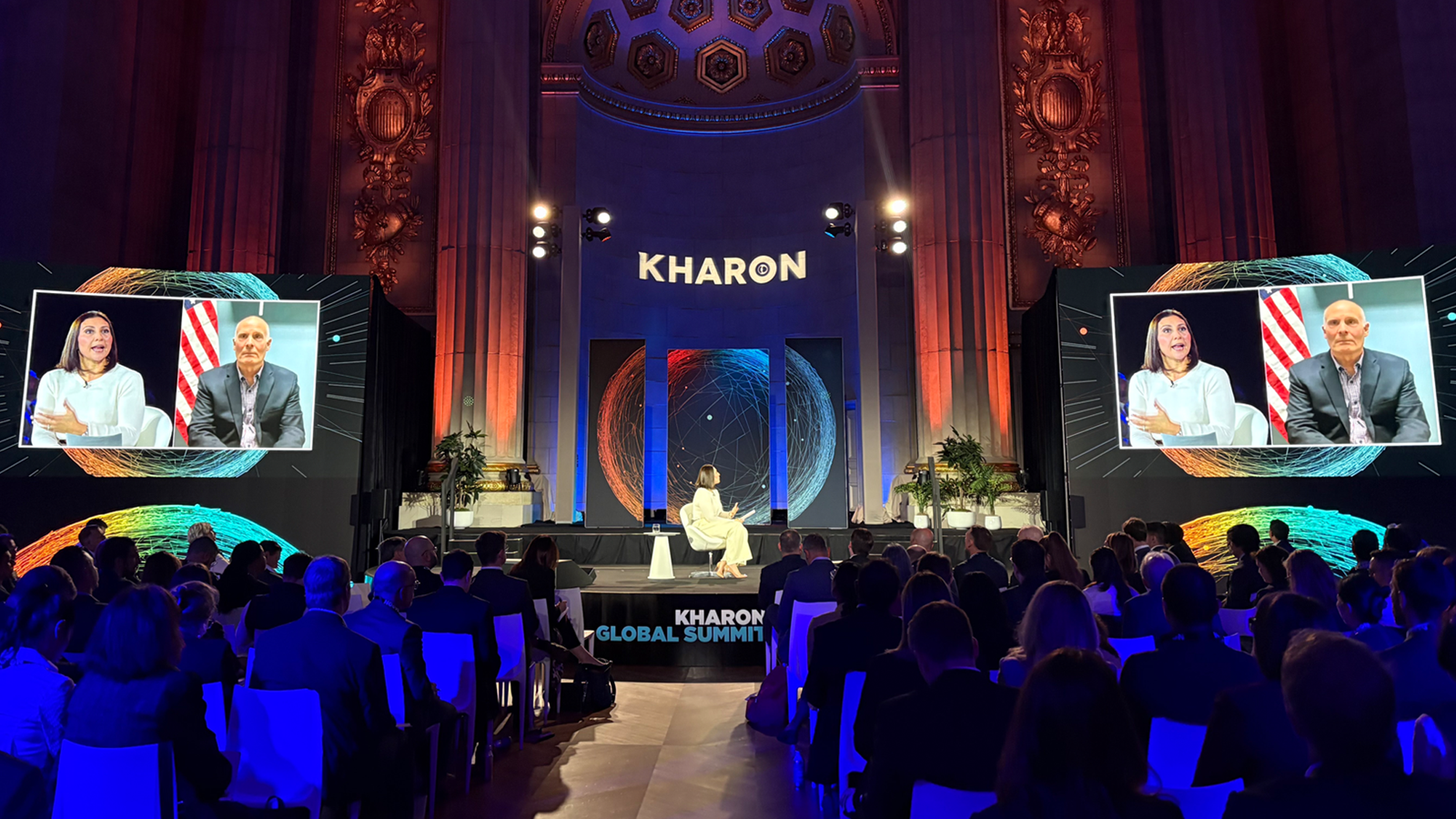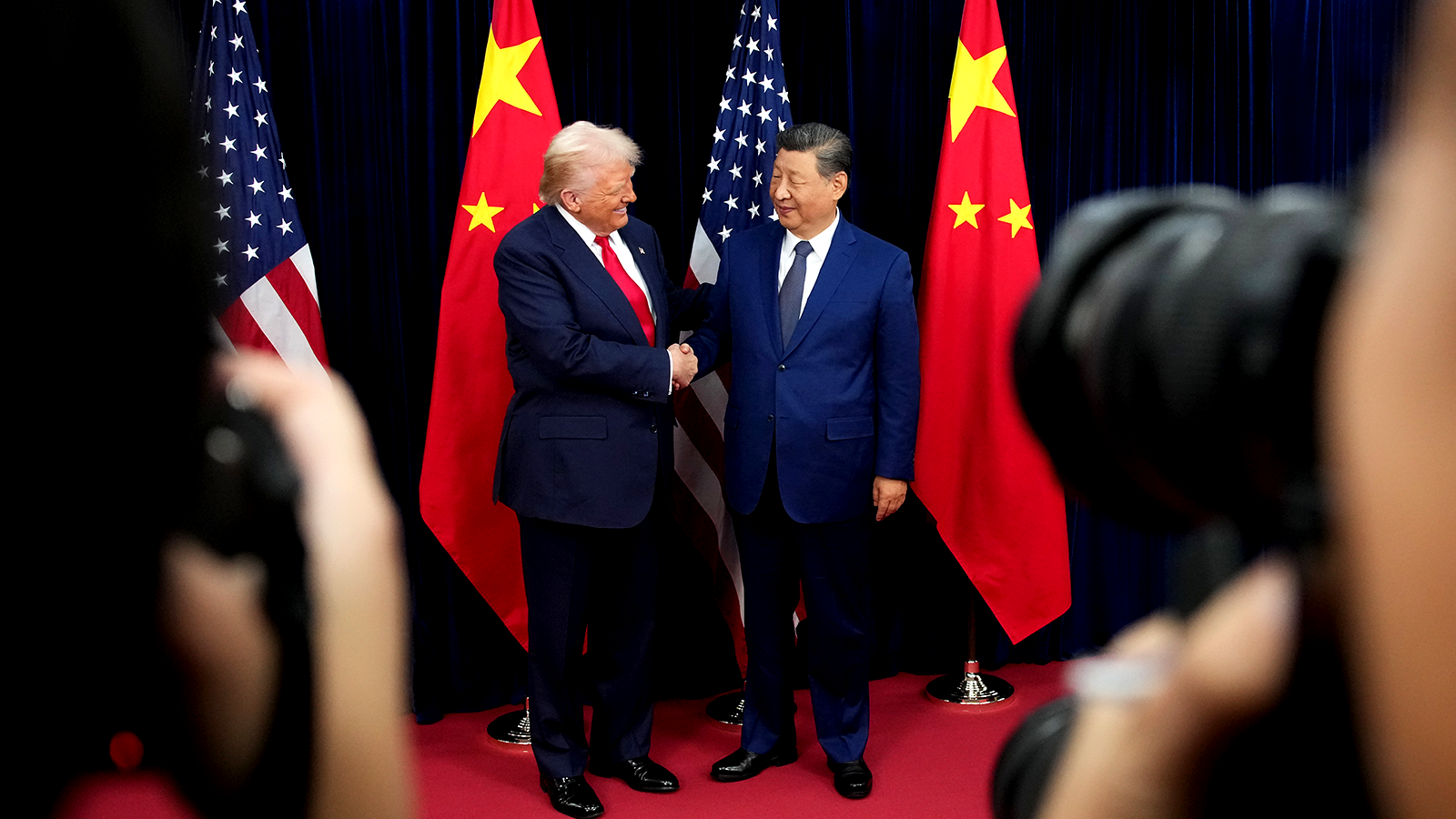The recent trade agreements between President Donald Trump and Chinese President Xi Jinping offer only a “temporary” reprieve for businesses navigating U.S.-China economic restrictions, the chair of the House’s China panel warned Wednesday.
Rep. John Moolenaar (R-Michigan), who leads the Select Committee on the Chinese Communist Party, said the one-year détente—including a pause on a planned U.S. expansion of export controls and a partial lifting of tariffs—should not be mistaken for a fundamental policy shift.
“We have to recognize that’s only a temporary one-year commitment, and often what we find with China is they don’t live up to their commitments,” Moolenaar said, appearing at the Kharon Global Summit by video call from his home district.
Speaking to more than 300 financial, legal, industry and government officials, Moolenaar weighed in on a range of other top China topics, too, from AI chip controls to investment to Hong Kong.
Here are four highlights.
“Lessen your dependence on China,” he said. The CCP “will use that dependence as leverage. And as Americans, we aim to promote peace through strength, and they respond only to strength in negotiations. And the more leverage they have, the more they’re going to use that.”
Moolenaar pointed to flows of American capital into China as particularly problematic.
Rep. John Moolenaar (R-Michigan), who leads the Select Committee on the Chinese Communist Party, said the one-year détente—including a pause on a planned U.S. expansion of export controls and a partial lifting of tariffs—should not be mistaken for a fundamental policy shift.
“We have to recognize that’s only a temporary one-year commitment, and often what we find with China is they don’t live up to their commitments,” Moolenaar said, appearing at the Kharon Global Summit by video call from his home district.
Speaking to more than 300 financial, legal, industry and government officials, Moolenaar weighed in on a range of other top China topics, too, from AI chip controls to investment to Hong Kong.
Here are four highlights.
1. ‘Complicit’ Investment in China’s Military Base
When moderator Hagar Chemali, former spokesperson for the U.S. Mission to the United Nations, asked Moolenaar what one message he most wanted to give the audience, Moolenaar was blunt.“Lessen your dependence on China,” he said. The CCP “will use that dependence as leverage. And as Americans, we aim to promote peace through strength, and they respond only to strength in negotiations. And the more leverage they have, the more they’re going to use that.”
Moolenaar pointed to flows of American capital into China as particularly problematic.

Hagar Chemali, former spokesperson for the U.S. Mission to the United Nations. (Kharon photo)
His committee has pushed to expand the Treasury Department’s outbound investment program. Language in the latest Senate version of the National Defense Authorization Act, Chemali noted, would expand the rule to restrict U.S. investment in Chinese firms developing hypersonic weapons and other sensitive technologies.
"We have been complicit in American investor dollars, even American government research dollars, going to help the military-industrial build-up of China’s People’s Liberation Army, also their surveillance state," Moolenaar said.
The rule was suspended last week, the White House said, in exchange for China’s own suspension of export controls on rare earth minerals. But Moolenaar said businesses shouldn’t take the arrangement for granted, given what he characterized as Beijing’s track record.
“There’s not a tradition of integrity and keeping commitments in the Chinese Communist Party,” he said. “They’re going to continue to try and steal technologies, they’re going to continue to try and drive American and other companies out of business through overproduction capacity, and they’re going to continue their dual-use-technology efforts, their civil-military fusion that enhances their military strength and use that to leverage other countries, including the United States.”
That could make for a tenuous U.S.-China truce; a later panel, on export controls, discussed the possibility that the rule could “come back at any time.”
Despite its suspension, “I think the Affiliates Rule is important,” Moolenaar said. “People who are thinking about their supply chains and markets should be aware that that is an important component in an export-control regime.”
“It’s a very different Hong Kong than it once was,” he said. He cited Beijing’s broken promises on “one country, two systems,” the framework that was supposed to preserve the city’s autonomy and legal independence from mainland China.
“Hong Kong has become a central hub for that illicit activity,” Moolenaar said. “At the same time, American investors, many unknowingly, are investing in the Hong Kong exchange.”
His House committee in August proposed an approach to AI chip exports to China that would dynamically adjust restrictions to balance core policy goals: “ensure China’s dependence on U.S. hardware, protect U.S. semiconductor companies, as well as limit China’s AI capabilities.”
“We have export controls in place that hopefully preserve America’s lead in this area, partnering with like-minded nations,” Moolenaar said Wednesday. “This isn’t about shutting down China’s economy—it’s about ensuring we don’t empower a government that uses these technologies to strengthen its military and surveillance state.”
"We have been complicit in American investor dollars, even American government research dollars, going to help the military-industrial build-up of China’s People’s Liberation Army, also their surveillance state," Moolenaar said.
2. The Affiliates Rule and a Fragile Truce
The Affiliates Rule, or 50% rule, that the Bureau of Industry and Security announced in September would extend export-licensing requirements to companies majority-owned by parties on the Entity List, Military End-User List or a subset of the list of Specially Designated Nationals. Its goal was to close longstanding loopholes that allow listed parties to use their non-listed subsidiaries or partners to keep acquiring sensitive technologies.The rule was suspended last week, the White House said, in exchange for China’s own suspension of export controls on rare earth minerals. But Moolenaar said businesses shouldn’t take the arrangement for granted, given what he characterized as Beijing’s track record.
“There’s not a tradition of integrity and keeping commitments in the Chinese Communist Party,” he said. “They’re going to continue to try and steal technologies, they’re going to continue to try and drive American and other companies out of business through overproduction capacity, and they’re going to continue their dual-use-technology efforts, their civil-military fusion that enhances their military strength and use that to leverage other countries, including the United States.”
That could make for a tenuous U.S.-China truce; a later panel, on export controls, discussed the possibility that the rule could “come back at any time.”
Despite its suspension, “I think the Affiliates Rule is important,” Moolenaar said. “People who are thinking about their supply chains and markets should be aware that that is an important component in an export-control regime.”
3. Hong Kong, Evasion Hub
Moolenaar also flagged Hong Kong’s role as what his committee calls a “global epicenter for illicit finance”: a hub for money laundering and sanctions evasion tied to Russia, Iran and North Korea.“It’s a very different Hong Kong than it once was,” he said. He cited Beijing’s broken promises on “one country, two systems,” the framework that was supposed to preserve the city’s autonomy and legal independence from mainland China.
“Hong Kong has become a central hub for that illicit activity,” Moolenaar said. “At the same time, American investors, many unknowingly, are investing in the Hong Kong exchange.”
4. Protecting a U.S. AI ‘Lead’
Calls for greater—and more targeted—government resources for enforcement were a theme throughout the event. Moolenaar zeroed in on increased funding and modernization of BIS, including AI-enhanced monitoring capabilities and better coordination with allies like Japan and the Netherlands.His House committee in August proposed an approach to AI chip exports to China that would dynamically adjust restrictions to balance core policy goals: “ensure China’s dependence on U.S. hardware, protect U.S. semiconductor companies, as well as limit China’s AI capabilities.”
“We have export controls in place that hopefully preserve America’s lead in this area, partnering with like-minded nations,” Moolenaar said Wednesday. “This isn’t about shutting down China’s economy—it’s about ensuring we don’t empower a government that uses these technologies to strengthen its military and surveillance state.”













